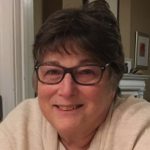
By Debbie Minden – Patient
When I was diagnosed with CLL in 2004, a 52-year-old woman, I was told by several doctors that I had a “good cancer.” I think they meant that CLL moves slowly, and that I would probably die of something else first. Fourteen years later, I have a different understanding of my disease, and a different world view. I have done FCR, Bendamustine and Rituxan, Ibrutinib, Zydelig, CAR-T—people around me seem to see me as a hero who is willing to do anything to stay alive. That was true at one point, but with more treatment and more treatment failures, my attitude has changed. After seven treatments in fourteen years, I don’t see the utility of one more treatment without compelling reasons.
Cancer is not something to be fought against without complaint and with a cheerful smile and good word for everyone, as so many obituaries say. Rather, it is an entity that you walk through life with. Sometimes it walks on the other side of the street and you hardly think about it, and at other times it runs circles around you, stepping on your toes and heels, trying to trip you up and throw you off course.
I am not depressed or being defeatist. I am being honest with myself after many long years of treatment that have allowed me the privilege of watching my children in stable relationships and meeting and loving my 3 grandsons. I have a feeling that I will be lucky to see 70. I think about leasing a new car rather than buying one. There is no point in fooling myself that I will dance at my 3-year-old grandson’s wedding.
Next week, I have an appointment with the palliative people at my hospital because I want the information I need when making decisions at this point. No one really talks to you about the end of this disease, and I want my loved ones to be prepared and know what my desires are. I also need to sort my own feelings out. I’ve realized that at some point I have to stop looking for the next treatment, I have to make peace with where I am. I don’t want to die in the middle of a clinical trial, neglecting the people who I love.
For a long time, I listened to and respected my doctors and followed with little thought through each step of my journey. I’m very grateful to my doctors. I would not be here without their care and expertise. At some point, however, you really have to go alone. The doctors don’t own you. They’re not the only people who have a say. We are so afraid of mortality that we never stop to make a plan. We need to encourage our doctors to speak to us sooner about the end game. That is part of being a member of the team and an educated consumer. It is also part of being strong.
Debbie Minden in a retired school psychologist living in Virginia. She is married to her husband Gary, and has 4 adult daughters and 3 grandsons under the age of 3. All of them keep her busy and engaged with life. She was diagnosed with CLL in 2004 at the age of 52. Since then, she has tried not to make this disease the center of her life and has worked on maintaining employment, friends, and interests. It is not always easy, but certainly necessary. At this point, she is looking for answers to questions such as what happens next, and how do I make peace with a truncated existence without bitterness and anger. She is also working to imprint her love and values on her young grandsons so they can carry her life into the future with them.
Originally published in The CLL Tribune Q2 2018.

















